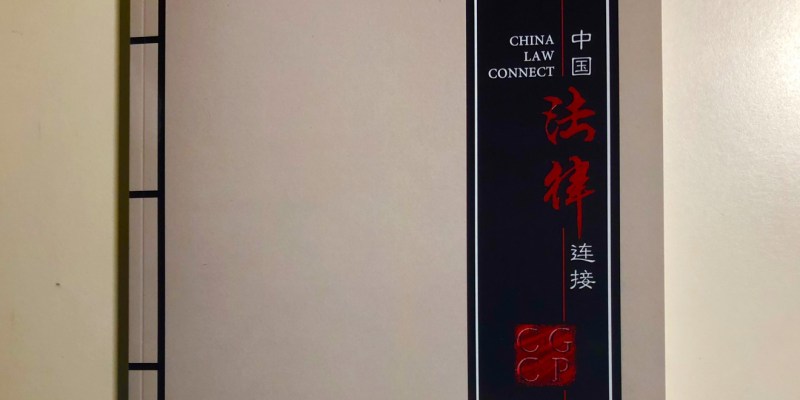The China Guiding Cases Project (CGCP) — founded by Stanford Law School lecturer Mei Gechlik J.S.D. ’01 to support unification of China’s legal standards and improve transparency in the Chinese judiciary — will launch the third issue of its quarterly professional journal, China Law Connect (CLC), in December.
The CGCP was formed in February 2011 following the Supreme People’s Court of China’s 2010 publication of the “Provisions of the Supreme People’s Court Concerning Work on Case Guidance,” which established China’s case guidance system.
China is traditionally a civil law country, which means that codified laws take precedence over previous judgements. However, the Supreme People’s Court has thus far released 96 guiding cases based on rulings that have already come into legal effect. While the guiding cases are not binding in the same way that precedence is in the United States, Chinese courts are still expected to refer to relevant guiding cases when adjudicating subsequent cases.
“[The case guidance system is] a big deal because it really increases transparency, since you know what to expect when you go to court,” said Jennifer Ingram J.D. ’12, who has worked on the project since its inception. “The guiding cases themselves are highly structured and make clear the significance of the case and what legal rules apply, and to have that kind of very structured blueprint … is really beneficial to understanding how a case would turn out in the future.”
To date, the CGCP has identified over 1,000 cases referencing the guiding cases, which cover different areas of law such as intellectual property, financial crimes, food safety and environmental pollution.
Before the publication of the first issue of CLC in June, the CGCP’s knowledge base was primarily found on the group’s website, which provides an online suite of products, including translations of guiding cases and commentaries in both Mandarin Chinese and English. Now, however, the CGCP has decided to make the quarterly journal its core product.
Each CLC issue includes a commentaries section consisting of three types of pieces: traditional commentaries providing longer scholarship of matters related to Chinese law, Experts Connect pieces by worldwide scholars presenting their perspectives on certain legal issues and China Cases Insights Writing Contest submissions from both professionals and students that analyze the impact of important recent cases in China.
CLC also includes a Spotlight series in which CGCP interviews experts and examines recent developments in countries involved in China’s Belt and Road initiative.
“The Spotlight series takes a few different people who are crucial to the project from around the world to speak about their engagement with the project, why it’s important to them and their country and what they think the Belt and Road initiative would do for their country,” said Cami Katz ’21, who joined the team this spring and is currently working on the series. “We’re going to be trying to target different areas of the world and look at implications of Belt and Road on that region.”
Currently the full content of each piece published in CLC is available online. Beginning in 2019, however, the CGCP will only post article headings and excerpts on its website. The journal will be available for sale through an online subscription form.
In addition to the commentaries and Spotlight series, future CLC issues will include translations and analyses of guiding cases, noting whether subsequent cases apply a guiding case or whether they effectively distinguish a guiding case from the pending case.
Gechlik said that the group is currently looking to update past translations now that it has more experience handling the cases.
“In order to get everything right, it’s extremely difficult because the same legal concept may only be applicable in China,” Gechlik said. “You have to use English words to translate accurately without any loaded meaning carrying American legal principles unless those legal principles are applicable in China.”
Beyond its focus on CLC, the CGCP seeks to undertake capacity-building activities such as training workshops and seminars for legal actors. The CGCP anticipates hosting a potential large-scale conference every few years, similar to one it held in March in the Stanford Center at Peking University in Beijing, for legal actors to discuss China’s guiding cases and other important topics such as Belt and Road legal developments.
The CGCP also aims to advance public education and participation through videos on CGCP Classroom, which provides interactive educational resources and videos covering important legal cases and featuring clips of interviews with leading experts. These videos, which are accessible on the CGCP website or through the Chinese social media platform WeChat, also direct viewers to relevant full-text analyses in CLC.
Additionally, the CGCP produces analytics and surveys that highlight trends with respect to the release of the guiding cases, including information about what counties and provinces they encompass and what areas of law they cover.
“In addition to the translations themselves, [data analytics] is something that more and more people have been interested in,” Ingram said. “There are so many guiding cases that are continuing to be published, and identifying the trends is something that has been really important just to understand where the Supreme People’s Court seems to be focusing its attention.”
Gechlik emphasized the program’s efforts to work with people of diverse backgrounds worldwide to advance global understanding of Chinese law.
“The CGCP’s impressive progress thus far would not have been possible had we not had the support and guidance of our 50 advisers, consisting of U.S. and Chinese judges as well as other legal experts, and the assistance of our nearly 200 committed members around the world, who are primarily law students, young lawyers and translation professionals,” she said.
Contact Michelle Leung at mleung2 ‘at’ stanford.edu.
